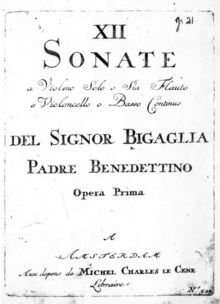Diogenio Bigaglia
Diogenio Bigaglia | |
|---|---|
 Title-page of the XII Sonate a Violino Solo o sia Flauto, Amsterdam: Le Cène, circa 1722 | |
| Born | circa 1676 Murano, Republic of Venice |
| Died | circa 1745 Venice |
| Occupation | Benedictine monk |
| Language | Italian |
| Nationality | Venetian |
Diogenio Bigaglia (c.1676 – c.1745) was a Venetian monk, and a well-known composer and virtuoso of his time.[1]: 94
Life
Diogenio Bigaglia was born on the island of Murano, just north of Venice. He entered the Benedictine monastery of San Giorgio Maggiore in Venice in 1694. In 1700 he was ordained a priest, and in 1713 became the prior of the monastery.[2][3]
Works
Bigaglia composed both sacred and secular vocal works. Of his larger sacred compositions little has survived. His instrumental music includes several polyphonic concerti and solo concertos, notably his 12 sonatas for violin or recorder (flauto) and Basso continuo Op. 1 (published by Le Cène, Amsterdam, 1715).
References
- ^ Johann Gottfried Walther (1732). Musicalisches Lexicon Oder Musicalische Bibliothec (in German). Leipzig: Deer. Page 94.
- ^ Hansell, Sven and Olga Termini: 'Bigaglia, Diogenio', in The New Grove Dictionary of Music and Musicians, London, New York, Massachusetts 2001, ISBN 1-56159-239-0. doi:10.1093/gmo/9781561592630.article.03066.
- ^ Wind, Thiemo: Bigaglia's Sonata in A minor, a new look at its originality. The Recorder and Music Magazine, Vol. 8 no. 2 (1984), 49-54.
